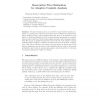Free Online Productivity Tools
i2Speak
i2Symbol
i2OCR
iTex2Img
iWeb2Print
iWeb2Shot
i2Type
iPdf2Split
iPdf2Merge
i2Bopomofo
i2Arabic
i2Style
i2Image
i2PDF
iLatex2Rtf
Sci2ools
GFKL
2004
Springer
2004
Springer
Reservation Price Estimation by Adaptive Conjoint Analysis
Abstract. Though reservation prices are needed for many business decision processes, e.g., pricing new products, it often turns out to be difficult to measure them. Many researchers reuse conjoint analysis data with price as an attribute for this task (e.g., Kohli and Mahajan (1991)). In this setting the information if a consumer buys a product at all is not elicited which makes reservation price estimation impossible. We propose an additional interview scene at the end of the adaptive conjoint analysis (Johnson (1987)) to estimate reservation prices for all product configurations. This will be achieved by the usage of product stimuli as well as price scales that are adapted for each proband to reflect individual choice behavior. We present preliminary results from an ongoing large-sample conjoint interview of customers of a major mobile phone retailer in Germany.
Related Content
| Added | 01 Jul 2010 |
| Updated | 01 Jul 2010 |
| Type | Conference |
| Year | 2004 |
| Where | GFKL |
| Authors | Christoph Breidert, Michael Hahsler, Lars Schmidt-Thieme |
Comments (0)

